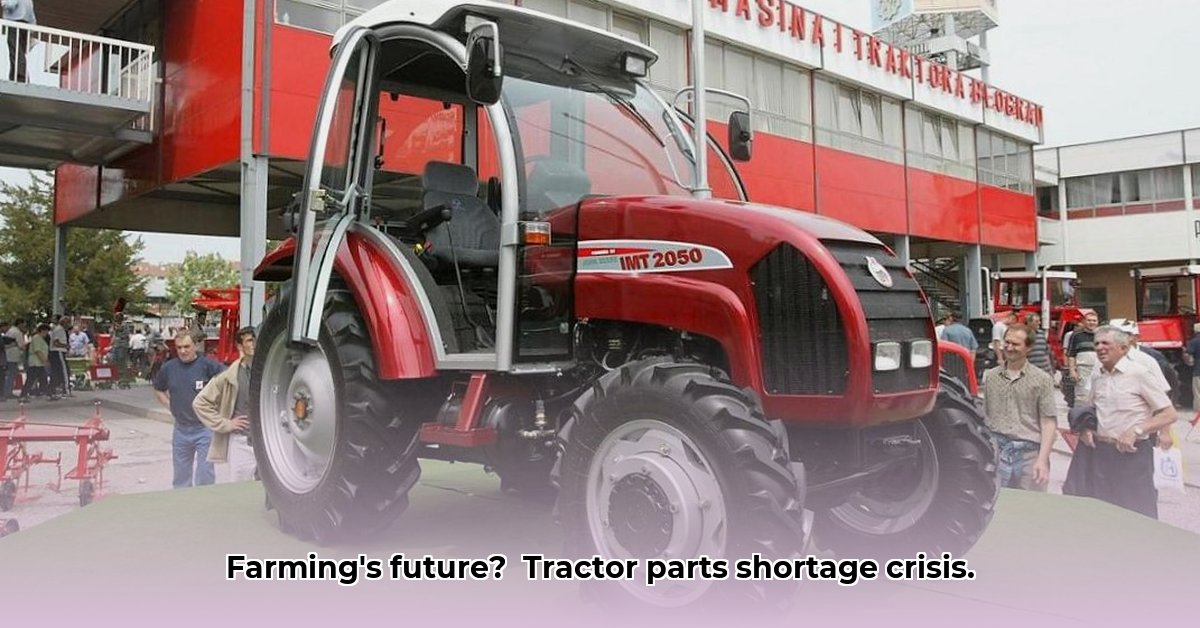
The farming world faces a critical challenge: a shortage of parts for IMT tractors, particularly impacting sustainable agriculture practitioners who rely on these machines for their efficiency and environmental friendliness. AG-Industrial Inc.'s recent decision to cease IMT parts sales has created a ripple effect, leaving farmers with costly downtime and uncertain futures. For smaller tractors, consider options like those found at this helpful resource. This article provides actionable intelligence to navigate this crisis, offering both immediate and long-term solutions to keep your IMT tractor running and your farm productive.
The Problem: AG-Industrial's Decision and its Ripple Effect
AG-Industrial Inc.'s abrupt halt to IMT tractor parts sales has triggered a significant crisis for farmers. This decision has led to a shortage of essential components, leaving repair shops struggling and farmers facing increased costs, extended repair times, and potential equipment failure. The lack of readily available parts directly translates to lost productivity and potential financial ruin, underscoring the fragility of the agricultural equipment supply chain. This situation disproportionately affects sustainable farms, which often rely on older, more fuel-efficient IMT tractors. The ripple effect extends across the agricultural ecosystem, raising concerns about food security and the viability of environmentally conscious farming practices.
Understanding the IMT Landscape
IMT tractors hold a significant global market position, particularly in Europe, Africa, and parts of Asia. TAFE's acquisition of IMT in 2018 aimed to enhance parts distribution globally. However, the US market appears uniquely affected by the current parts shortage, suggesting potential issues with distribution networks, regulatory compliance, or market demand within the US. This discrepancy highlights the need for a deeper understanding of the factors influencing supply chain dynamics at a regional level. Further research is necessary to pinpoint the root causes of this US-specific problem.
Solutions and Strategies: Actionable Steps for Farmers
Farmers facing this challenge need immediate action. Here are short-term and long-term strategies to ensure the continuity of their operations:
Short-Term Strategies (Within the next year):
Source Alternative Parts: Expand your search beyond local suppliers. Explore online marketplaces like Cross Creek Tractor (https://www.crosscreektractor.com/products/by%20manufacturer/imt.aspx) and consider international vendors. Be persistent; finding the necessary components may take time and effort.
Prioritize Preventative Maintenance: Regular maintenance significantly reduces the need for replacement parts. Clean, lubricate, and thoroughly inspect your tractor regularly to prevent unexpected breakdowns. This proactive approach can significantly extend the lifespan of your equipment.
Engage with the IMT Community: Connect with other IMT owners online or through local farming groups. Sharing repair tips, part sources, and mechanic recommendations fosters collaboration and can be invaluable in overcoming this challenge.
Explore DIY Repairs: For basic repairs, utilize online resources, repair manuals, and YouTube tutorials. Even small DIY repairs contribute to minimizing costly downtime.
Long-Term Strategies (Planning for the next 3-5 years):
Advocate for Policy Change: Contact your elected officials to highlight the impact of this parts shortage on your farm and the broader agricultural community. Advocate for policies supporting domestic agricultural repair networks and improved lifecycle management of parts.
Consider Equipment Upgrades (if feasible): Depending on financial capacity, evaluate upgrading to a tractor with readily available parts. This is a significant investment requiring thorough financial planning.
Maintain Comprehensive Records: Meticulously document all repairs, parts used, and maintenance performed. This history proves invaluable for future decision-making and potential equipment upgrades.
The Broader Implications for Sustainable Agriculture
The IMT parts shortage directly threatens the principles of sustainable agriculture. Many farmers choose IMT tractors for their fuel efficiency, a cornerstone of environmentally friendly practices. The difficulty in maintaining these tractors could force a shift toward newer, potentially less fuel-efficient models, undermining sustainability goals. This highlights the interconnected nature of equipment access, farm economics, and environmental stewardship. The economic and environmental consequences of this parts crisis reach far beyond the individual farmer.
Looking Ahead: Future of IMT Parts and the Supply Chain
The future of IMT parts and the broader agricultural equipment supply chain remains uncertain. However, this crisis emphasizes the necessity for improved parts management. This includes exploring options like part remanufacturing, leveraging 3D-printing for custom parts, and fostering collaborative approaches. The long-term solution likely involves technological advancements, improved supply chain resilience, and strengthened farmer-manufacturer relationships.
Conclusion
The IMT tractor parts crisis underscores the vulnerabilities within the agricultural equipment supply chain. Collaborative efforts between farmers, policymakers, and manufacturers are crucial to build a resilient and sustainable system, ensuring access to essential parts for all farmers. Proactive planning and immediate action are essential for navigating this challenge and ensuring the future of sustainable agriculture.